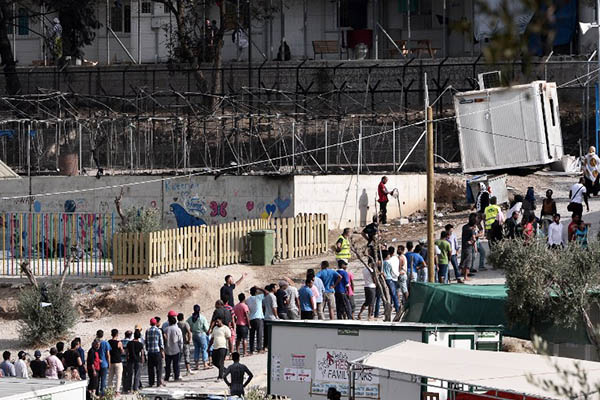
Louisa Gouliamaki—AFP
Overcrowding remains a major concern as facilities for 3,000 people are hosting double that amount.
Greece on Wednesday managed to find shelter for some 5,000 migrants on the island of Lesbos two days after a fire ravaged part of the main asylum seekers’ camp, officials said. But overcrowding remains an acute concern on the island, one of the epicenters of the European migrant crisis, they said.
“The situation is calm but it has not been resolved,” Lesbos Mayor Spyros Galinos told AFP. “The glass has overflown… [the facilities] were built for 3,000 people and there are now 6,000. The locals are worried. There must be immediate steps to address the overcrowding,” Galinos said.
Thousands fled Monday when dozens of tents and shelters at the Moria camp on the island of Lesbos were torched, in a blaze sparked when migrants of different nationalities got into a brawl.
According to police, the fire destroyed 60 pre-fabricated shelters, 100 tents and three reformed shipping containers that housed camp services. The people arrested—including Afghans, Iraqis as well as one national each from Senegal, Syria and Cameroon—were taken into custody over the violence that led to the fire, a police source said.
Many had returned to the camp by Wednesday, while vulnerable minors were temporarily lodged in a former children’s village already housing migrant families. Others were shifted to the island’s second camp of Kara Tepe and some spent the night in churches, said Efi Latsoudi, a human rights activist who was decorated for her work on Lesbos by the U.N. refugee agency earlier this month.
“There needs to be a long-term plan. Human lives and our dignity are at stake,” she told Sto Kokkino radio.
The merchant marine ministry said a ferry is expected by Thursday to provide additional accommodation.
Fights amongst refugees and migrants, who are forced to wait for months for their asylum applications to be processed, are common in the camps. “Afghans fight Syrians and Africans. We don’t have food, we don’t have facilities or medicine,” said Diego, a 36-year-old Eritrean former soldier housed at Moria. “People in the camp are tired, they are tired of staying in the camp. Everybody wants freedom, everybody want to leave the camp,” added Alex, a 19-year-old Nigerian man.
The merchant marine ministry’s general secretary Yiannis Yiannelis-Theodosiadis blamed the deadlock on insufficient staff sent by the European Union to help Greece in the registration and asylum process. “If the European Asylum Support Office could send 150 staff instead of 13, the [refugees] could leave within a day,” Yiannelis-Theodosiadis said. “This is why people are stuck here for two to three months, because [they] cannot get a response to their appeals,” he said.
